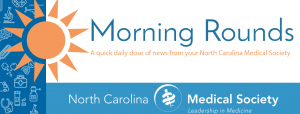Happy Friday! Enjoy your NCMS Morning Rounds!
October 22, 2021
Would Your Patients Benefit from a Y Medical Membership?
If you are a Triangle-area physician, the YMCA of the Triangle in partnership with Blue Cross and Blue Shield of North Carolina has evidence-based chronic disease prevention programs to support your patients through a YMCA Medical Membership program. You can refer a patient through the NCMS Foundation’s Our Community Health Initiative (OCHI) software platform directly to the YMCA of the Triangle for any of the six program offerings; diabetes prevention, weight management, high blood pressure, falls prevention, support for cancer survivors, or childhood and family weight management.
Medical Memberships are a bundled service that provide care coordination, a YMCA membership and the evidence-based program as prescribed due to your diagnosis.
Find out if a Medical Membership is right for your patients. Programs are starting soon! Enrollment is open for both in-person and virtual programs in September 2021. Your patients can find out more about cost and program enrollment here.
Learn more about how the YMCA is keeping you safe at our facilities and how patients can prepare for a visit to the YMCA
For additional questions please contact Medical Membership at [email protected] or at 919-582-9396
NCMS Medicaid Transformation Page
As a reminder, the NCMS is offering resources and a process to help you make the transition to Medicaid managed care. Visit our Medicaid Transformation page, where you will find a handy list of state and individual health plan resources as well as a special NCMS form to log any specific issues you are encountering.
*Please make sure that your first step is to reach out to the plan itself to log your problem before you share your issue with the NCMS. The NCMS and our partners will give an aggregated list of concerns to health plan representatives to make them aware of widespread issues.*
NCDHHS Announces Funding Opportunity to Serve Justice-Involved Individuals as COVID-19 Impacts Overdoses
The North Carolina Department of Health and Human Services today released a funding opportunity that will award a total of $5.8 million to at least nine organizations statewide to increase access to high-quality opioid use disorder treatment for people in the criminal justice system.
This program, made possible by an award from the federal Bureau of Justice Assistance, is soliciting applications for the NC Comprehensive Opioid Abuse Site-Based Program, which will reduce opioid-related deaths, improve access to evidence- based treatment and reduce future criminal justice involvement among the people served by these programs.
Read more and learn how to apply here.
In the News
Tuberculosis, Like Covid, Spreads by Breathing, Scientists Report, NYT, 10-19-21
Learning Opportunity
Rebuilding Public Trust in Biomedical Science and Research, November 4, 2021 | 12:00 PM – 4:00 PM ET
Join the National Academy of Medicine’s (NAM) Leadership Consortium Evidence Mobilization Action Collaborative for a webinar series focusing on rebuilding public trust in evidence-based health and biomedical research. This first webinar in the series will focus on exploring the factors that influence levels of public trust in health and biomedical research and evidence. The discussion will identify dimensions of distrust and surface key barriers to achieving public trust and improving the uptake of reliable information and seek to answer the following questions:
- What are the origins of distrust in health and biomedical research community and the longstanding societal/cultural, regulatory, and organizational challenges to building trust in the scientific process?
- What are the consequences that arise when there is a lack of trust in this research?
- How have political trends and the increasing usage of social media technology to spread misinformation during the COVID-19 pandemic exacerbated feelings of distrust toward the health and biomedical research sectors?
- How has a need for balance between scientific integrity and speed of product development contributed to distrust in scientific guidance?
- What conditions and strategies are needed to establish a strong foundation of transparency and trust?
- What are promising examples of fostering trust in communicating and disseminating scientific evidence in a neutral and objective manner?
If you have policies you’d like your NCMS Board of Directors to consider, please complete the Board input form here. Thanks for reading!

